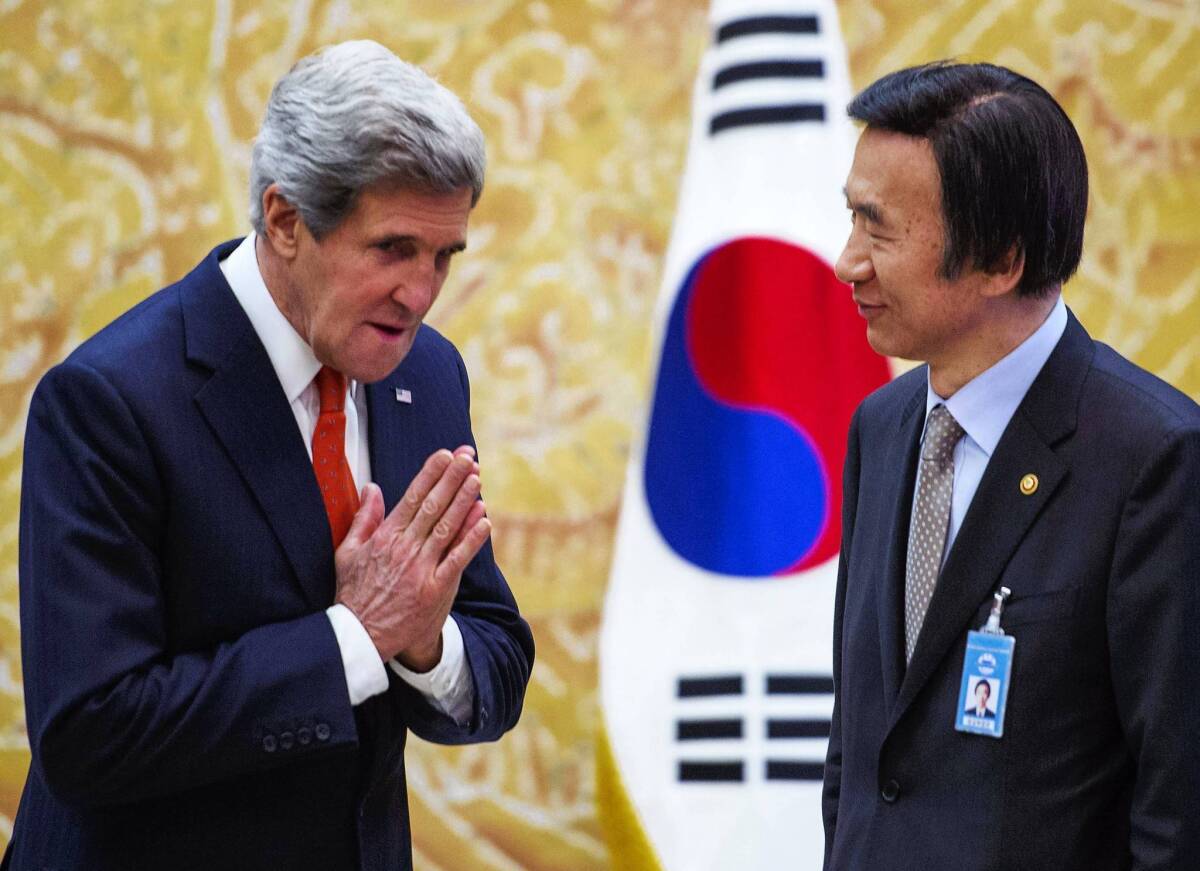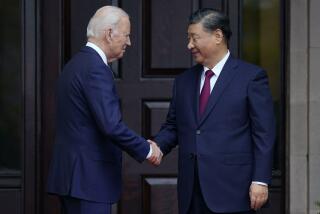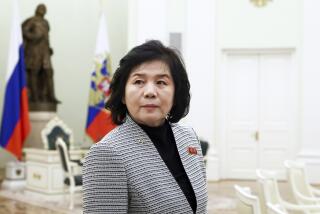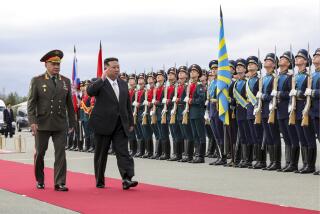Kerry visits China to urge action on North Korea

BEIJING — U.S. Secretary of State John F. Kerry arrived in Beijing on Saturday in hopes of turning the Chinese government’s obvious frustration with North Korea’s nuclear program into decisive action.
Kerry’s debut trip to East Asia as secretary has been shadowed by ominous threats from North Korea of nuclear attacks against the U.S. mainland and Washington’s allies in the region.
The Chinese have been unusually vocal in their condemnation of their old communist ally, with many prominent scholars saying it is time to cut the ties forged by Mao Tse-tung back in the Cold War era.
Touching down in Seoul on Friday afternoon, Kerry met with South Korea’s new president, Park Geun-hye, and Foreign Minister Yun Byung-se. Despite some tough talk directed at North Korea, the tone was more conciliatory than in recent weeks, with Kerry and the South Koreans suggesting there was an opening for the government in Pyongyang to return to negotiations over its nuclear program.
“The real goal should not be reinforcing the fact that we will defend our allies, which we will, but it should be emphasizing for everybody the possibilities of peace, the possibilities of reunification, the possibilities of a very different future for the people of the Republic of Korea and ultimately North Korea,” Kerry said, referring to South Korea by its official name.
As Kerry spoke, U.S. and South Korean intelligence were reporting that North Korea had moved as many as five missiles into launch position on its east coast. The most worrisome of them is a new medium-range missile known as the Musudan, which could potentially reach Guam and U.S. bases in Japan.
North Korea’s Kim Jong Un, the world’s youngest head of state at age 30, is hosting festivities this weekend for the April 15 birthday of his grandfather, Kim Il Sung, the nation’s founder. Analysts believe that the missile tests could be timed for the birthday, which is a major public holiday in North Korea.
“It is a huge mistake for him to choose to do that [a missile test] because it would further isolate his country and further isolate his people, who are frankly desperate for food, not missiles,” Kerry said in Seoul.
After weeks of joint military exercises by the U.S. and South Korea, including mock bombing by B-52s and stealth aircraft, there has been an effort to mute the drumbeats of war.
South Korea’s Park was quoted by her aides Friday as saying she was willing to “listen to what North Korea thinks.” Earlier this week, she suggested talks to salvage a jointly run industrial park in Kaesong, just north of the demilitarized zone, which had been a showpiece of inter-Korean cooperation before the North pulled all its workers. Yun, the foreign minister, also said South Korea was open to resuming humanitarian aid to its chronically famished neighbor.
Previous North Korea crises exposed rifts between the United States and South Korea, particularly during the George W. Bush administration, but this time the alliance is holding strong, foreign policy analysts say.
“We are pretty much in agreement about how to deal with them,” said Han Sung-joo, a former South Korean ambassador to Washington. “Together we have a strong defense, but if North Korea shows a change of attitude, both the United States and the Republic of Korea are willing to talk to them.”
The Chinese also have also moved measurably closer to the U.S., South Korea and Japan in condemning North Korea’s belligerence. A poll in Saturday’s Global Times, a Communist Party newspaper, said that 33.9% of Chinese living near the Korean border were afraid of war breaking out. State media has shown images of schoolchildren participating in air raid drills.
But U.S. policymakers want China to be more proactive in using its considerable economic leverage against Pyongyang. North Korea receives most of its fuel oil and consumer goods from China, and trading companies linked to the Pyongyang leadership keep funds in Chinese banks.
Like South Korea, China has a new leader, Xi Jinping, the general-secretary of the Communist Party who was elevated to the presidency last month. Assessing his views of Pyongyang will be a key element of Kerry’s brief visit here.
Kerry travels to Japan on Sunday.
Times special correspondent Jung-yoon Choi in Seoul contributed to this report.
More to Read
Start your day right
Sign up for Essential California for news, features and recommendations from the L.A. Times and beyond in your inbox six days a week.
You may occasionally receive promotional content from the Los Angeles Times.






